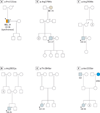Germline TP53 Mutations in Patients With Early-Onset Colorectal Cancer in the Colon Cancer Family Registry
- PMID: 26086041
- PMCID: PMC4465271
- DOI: 10.1001/jamaoncol.2015.0197
Germline TP53 Mutations in Patients With Early-Onset Colorectal Cancer in the Colon Cancer Family Registry
Abstract
Importance: Li-Fraumeni syndrome, usually characterized by germline TP53 mutations, is associated with markedly elevated lifetime risks of multiple cancers, and has been linked to an increased risk of early-onset colorectal cancer.
Objective: To examine the frequency of germline TP53 alterations in patients with early-onset colorectal cancer.
Design, setting, and participants: This was a multicenter cross-sectional cohort study of individuals recruited to the Colon Cancer Family Registry (CCFR) from 1998 through 2007 (genetic testing data updated as of January 2015). Both population-based and clinic-based patients in the United States, Canada, Australia, and New Zealand were recruited to the CCFR. Demographic information, clinical history, and family history data were obtained at enrollment. Biospecimens were collected from consenting probands and families, including microsatellite instability and DNA mismatch repair immunohistochemistry results. A total of a 510 individuals diagnosed as having colorectal cancer at age 40 years or younger and lacking a known hereditary cancer syndrome were identified from the CCFR as being potentially eligible. Fifty-three participants were excluded owing to subsequent identification of germline mutations in DNA mismatch repair genes (n = 47) or biallelic MUTYH mutations (n = 6).
Interventions: Germline sequencing of the TP53 gene was performed. Identified TP53 alterations were assessed for pathogenicity using literature and international mutation database searches and in silico prediction models.
Main outcomes and measures: Frequency of nonsynonymous germline TP53 alterations.
Results: Among 457 eligible participants (314, population-based; 143, clinic-based; median age at diagnosis, 36 years [range, 15-40 years]), 6 (1.3%; 95% CI, 0.5%-2.8%) carried germline missense TP53 alterations, none of whom met clinical criteria for Li-Fraumeni syndrome. Four of the identified TP53 alterations have been previously described in the literature in probands with clinical features of Li-Fraumeni syndrome, and 2 were novel alterations.
Conclusions and relevance: In a large cohort of patients with early-onset colorectal cancer, germline TP53 mutations were detected at a frequency comparable with the published prevalence of germline APC mutations in colorectal cancer. With the increasing use of multigene next-generation sequencing panels in hereditary cancer risk assessment, clinicians will be faced with the challenge of interpreting the biologic and clinical significance of germline TP53 mutations in families whose phenotypes are atypical for Li-Fraumeni syndrome.
Conflict of interest statement
Figures

Similar articles
-
TP53 germline mutation testing in 180 families suspected of Li-Fraumeni syndrome: mutation detection rate and relative frequency of cancers in different familial phenotypes.J Med Genet. 2010 Jun;47(6):421-8. doi: 10.1136/jmg.2009.073429. J Med Genet. 2010. PMID: 20522432
-
Identification of a Variety of Mutations in Cancer Predisposition Genes in Patients With Suspected Lynch Syndrome.Gastroenterology. 2015 Sep;149(3):604-13.e20. doi: 10.1053/j.gastro.2015.05.006. Epub 2015 May 14. Gastroenterology. 2015. PMID: 25980754 Free PMC article.
-
Germline Genetic Features of Young Individuals With Colorectal Cancer.Gastroenterology. 2018 Mar;154(4):897-905.e1. doi: 10.1053/j.gastro.2017.11.004. Epub 2017 Nov 14. Gastroenterology. 2018. PMID: 29146522 Free PMC article.
-
Current review of TP53 pathogenic germline variants in breast cancer patients outside Li-Fraumeni syndrome.Hum Mutat. 2018 Dec;39(12):1764-1773. doi: 10.1002/humu.23656. Epub 2018 Oct 3. Hum Mutat. 2018. PMID: 30240537 Review.
-
Tumor protein 53 mutations and inherited cancer: beyond Li-Fraumeni syndrome.Curr Opin Oncol. 2010 Jan;22(1):64-9. doi: 10.1097/CCO.0b013e328333bf00. Curr Opin Oncol. 2010. PMID: 19952748 Review.
Cited by
-
Validation of Recently Proposed Colorectal Cancer Susceptibility Gene Variants in an Analysis of Families and Patients-a Systematic Review.Gastroenterology. 2017 Jan;152(1):75-77.e4. doi: 10.1053/j.gastro.2016.09.041. Epub 2016 Oct 3. Gastroenterology. 2017. PMID: 27713038 Free PMC article. Review.
-
How does inflammation drive mutagenesis in colorectal cancer?Trends Cancer Res. 2017;12:111-132. Trends Cancer Res. 2017. PMID: 30147278 Free PMC article.
-
TRIP13, identified as a hub gene of tumor progression, is the target of microRNA-4693-5p and a potential therapeutic target for colorectal cancer.Cell Death Discov. 2022 Jan 24;8(1):35. doi: 10.1038/s41420-022-00824-w. Cell Death Discov. 2022. PMID: 35075117 Free PMC article.
-
Collaborative Group of the Americas on Inherited Gastrointestinal Cancer Position statement on multigene panel testing for patients with colorectal cancer and/or polyposis.Fam Cancer. 2020 Jul;19(3):223-239. doi: 10.1007/s10689-020-00170-9. Fam Cancer. 2020. PMID: 32172433 Free PMC article. Review.
-
Investigation of the Effects of Apigenin, a Possible Therapeutic Agent, on Cytotoxic and SWH Pathway in Colorectal Cancer (HT29) Cells.Adv Pharm Bull. 2023 Jan;13(1):188-195. doi: 10.34172/apb.2023.020. Epub 2021 Nov 28. Adv Pharm Bull. 2023. PMID: 36721804 Free PMC article.
References
-
- Ahnen DJ, Wade SW, Jones WF, et al. The increasing incidence of young-onset colorectal cancer: a call to action. Mayo Clin Proc. 2014;89(2):216–224. - PubMed
-
- Chang DT, Pai RK, Rybicki LA, et al. Clinicopathologic and molecular features of sporadic early-onset colorectal adenocarcinoma: an adenocarcinoma with frequent signet ring cell differentiation, rectal and sigmoid involvement, and adverse morphologic features. Mod Pathol. 2012;25(8):1128–1139. - PubMed
Publication types
MeSH terms
Substances
Grants and funding
- K24 CA113433/CA/NCI NIH HHS/United States
- U01 CA074799/CA/NCI NIH HHS/United States
- U24 CA074783/CA/NCI NIH HHS/United States
- U24 CA074794/CA/NCI NIH HHS/United States
- U24 CA074806/CA/NCI NIH HHS/United States
- U24 CA097735/CA/NCI NIH HHS/United States
- U01 CA074794/CA/NCI NIH HHS/United States
- P30 CA015083/CA/NCI NIH HHS/United States
- U01 CA097735/CA/NCI NIH HHS/United States
- UM1 CA167551/CA/NCI NIH HHS/United States
- CA-95-011/CA/NCI NIH HHS/United States
- U01 CA074783/CA/NCI NIH HHS/United States
- U24 CA074799/CA/NCI NIH HHS/United States
- U01 CA074806/CA/NCI NIH HHS/United States
- K24CA113433/CA/NCI NIH HHS/United States
- U24 CA074800/CA/NCI NIH HHS/United States
- U01 CA074800/CA/NCI NIH HHS/United States
LinkOut - more resources
Full Text Sources
Other Literature Sources
Medical
Research Materials
Miscellaneous

